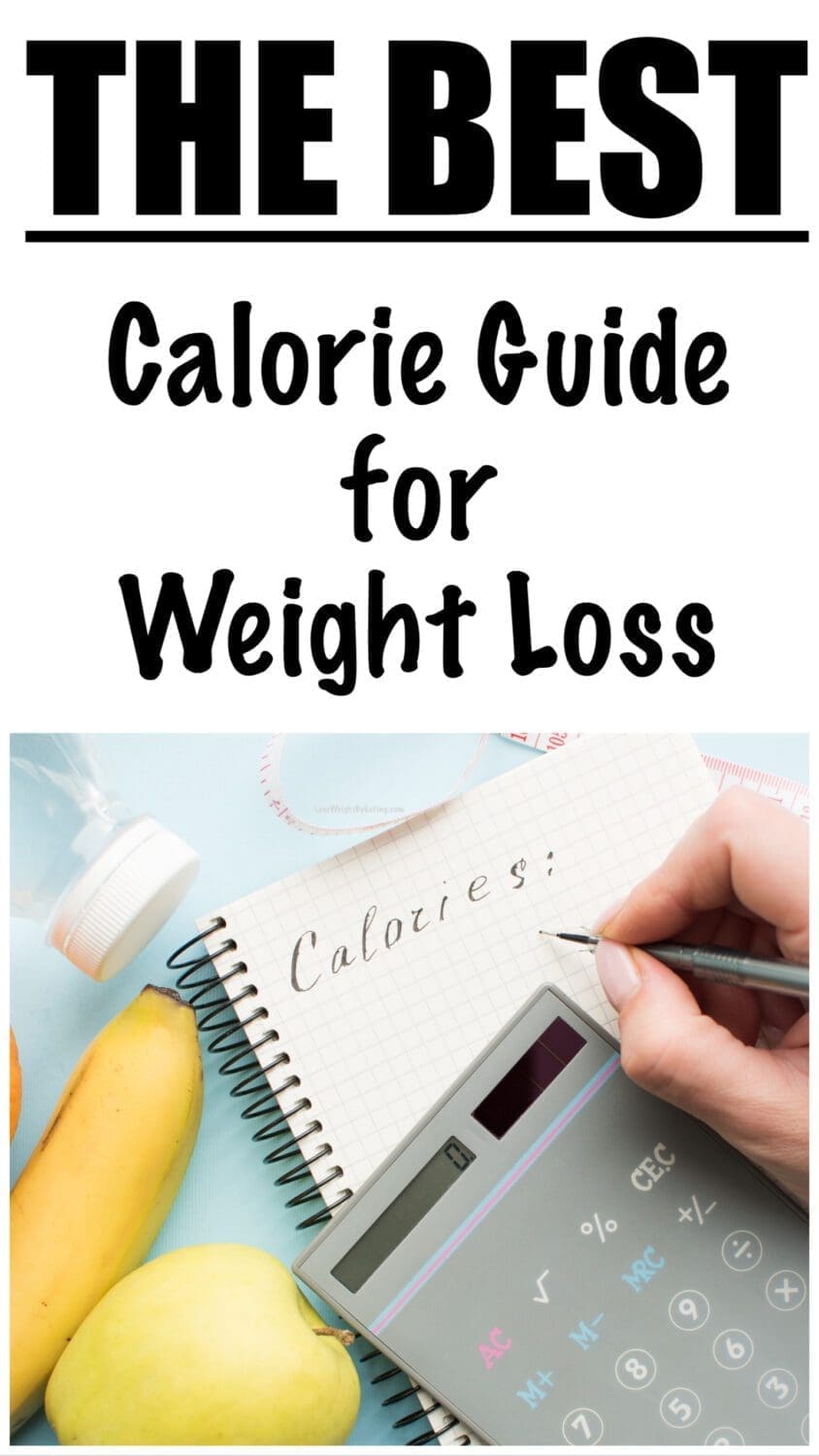Learn How Many Calories Should you Eat a Day for Weight Loss so you can maximize your weight loss efforts!
I’ll review how many calories women, men and even kids should have per day for best health and weight loss.


Calorie intake is an essential aspect of maintaining a healthy body weight, and it’s crucial to understand how many calories you need to consume every day. In this article, we’ll cover the basics of calorie intake and how it affects your body.
What are calories, and why are they important?
Calories are units of energy that come from the food and beverages we consume. They are vital for our body to function correctly, as they provide the energy we need to perform daily activities such as walking, running, and even breathing.
The number of calories you need depends on various factors such as age, gender, weight, height, and activity level.
How to calculate your daily calorie needs?
Calculating your daily calorie needs is relatively simple. You can use a calorie calculator to determine the number of calories you need to maintain your current weight or lose weight. However, keep in mind that these calculators only provide an estimate, and your actual calorie needs may vary.
Factors affecting your calorie needs
Your daily calorie needs are influenced by several factors such as age, gender, weight, height, and activity level.
As you age, your calorie needs decrease, and if you’re a woman, you need fewer calories than men. People who have a higher body weight and height require more calories, and those who are physically active need more calories than those who are sedentary.
How many calories should you consume to lose weight?
To lose weight, you need to create a calorie deficit, which means consuming fewer calories than your body needs.
A calorie deficit of 500-1000 calories per day can help you lose 1-2 pounds per week. However, it’s important to note that calorie restriction should be done under the guidance of a healthcare professional.
What happens if you consume too few calories?
Consuming too few calories can lead to several health problems such as malnutrition, nutrient deficiencies, and a weakened immune system. It can also slow down your metabolism, making it harder to lose weight.
So make sure you don’t cut calories too drastically, it won’t help your weight loss efforts!
How Many Calories you Should Eat on Average
The average daily calorie intake for adults ranges from 1,600 to 2,400 calories per day for women and 2,000 to 3,000 calories per day for men. However, the exact number of calories you need depends on several factors such as age, gender, weight, height, and activity level.
For example, a sedentary woman who is 30 years old and weighs 150 pounds may need around 1,800 calories per day to maintain her weight, while a moderately active man who is 40 years old and weighs 180 pounds may need around 2,500 calories per day to maintain his weight.
It’s important to note that these are just estimates, and your actual calorie needs may be higher or lower. If you’re trying to lose weight, it’s recommended to create a calorie deficit of 500-1000 calories per day, which can help you lose 1-2 pounds per week.
In addition to the quantity of calories, it’s also important to consider the quality of the calories you consume. A diet rich in nutrient-dense foods such as fruits, vegetables, whole grains, and lean protein sources can help you meet your daily calorie needs while providing essential vitamins and minerals for optimal health.
The average daily calorie intake for adults ranges from 1,600 to 3,000 calories per day, depending on various factors such as age, gender, weight, height, and activity level. It’s crucial to consume high-quality, nutrient-dense foods to meet your daily calorie needs while supporting your overall health and wellbeing.
How Many Calories Women Should Eat to Lose Weight
To lose weight, women generally need to create a calorie deficit by consuming fewer calories than they burn through physical activity and daily living. The recommended calorie deficit for weight loss is around 500-1000 calories per day, which can result in a loss of 1-2 pounds per week.
The exact number of calories a woman should consume to lose weight depends on her individual needs and factors such as age, weight, height, and activity level. A safe and effective rate of weight loss for women is around 0.5-1.0 percent of their body weight per week.
As a general guideline, women who are moderately active and want to lose weight may need around 1,200 to 1,500 calories per day, while women who are very active may need around 1,500 to 1,800 calories per day. However, it’s important to consult with a healthcare professional or registered dietitian to determine the appropriate calorie intake for your specific needs and goals.
In addition to reducing calorie intake, women can also support weight loss by increasing physical activity, eating a balanced and nutrient-dense diet, and reducing stress levels. Combining these strategies can lead to sustainable and long-term weight loss.
It’s important to note that weight loss should always be approached in a safe and healthy manner, and crash diets or excessively low calorie intake can lead to nutrient deficiencies, slowed metabolism, and other negative health effects.
Women who want to lose weight should aim to create a calorie deficit of around 500-1000 calories per day, while also engaging in regular physical activity, eating a balanced and nutrient-dense diet, and managing stress levels. Consulting with a healthcare professional or registered dietitian can help determine the appropriate calorie intake and weight loss strategies for individual needs and goals.
How Many Calories Men Should Eat to Lose Weight
To lose weight, men generally need to create a calorie deficit by consuming fewer calories than they burn through physical activity and daily living. The recommended calorie deficit for weight loss is around 500-1000 calories per day, which can result in a loss of 1-2 pounds per week.
The exact number of calories a man should consume to lose weight depends on his individual needs and factors such as age, weight, height, and activity level. A safe and effective rate of weight loss for men is around 1-2 pounds per week.
As a general guideline, men who are moderately active and want to lose weight may need around 1,500 to 1,800 calories per day, while men who are very active may need around 1,800 to 2,500 calories per day. However, it’s important to consult with a healthcare professional or registered dietitian to determine the appropriate calorie intake for your specific needs and goals.
In addition to reducing calorie intake, men can also support weight loss by increasing physical activity, eating a balanced and nutrient-dense diet, and reducing stress levels. Combining these strategies can lead to sustainable and long-term weight loss.
It’s important to note that weight loss should always be approached in a safe and healthy manner, and crash diets or excessively low calorie intake can lead to nutrient deficiencies, slowed metabolism, and other negative health effects.
Men who want to lose weight should aim to create a calorie deficit of around 500-1000 calories per day, while also engaging in regular physical activity, eating a balanced and nutrient-dense diet, and managing stress levels. Consulting with a healthcare professional or registered dietitian can help determine the appropriate calorie intake and weight loss strategies for individual needs and goals.
Calorie Recommendations for Better Health
The recommended daily calorie intake for good health depends on individual factors such as age, sex, height, weight, and activity level. Generally speaking, a balanced and nutrient-dense diet that provides enough energy to fuel daily activities is key for overall health and wellbeing.
Here are some general guidelines for daily calorie intake:
- Men: The recommended daily calorie intake for men varies depending on their age, weight, height, and activity level. On average, men need around 2,500 calories per day to maintain their weight, but this can range from 2,000 to 3,000 calories per day. It’s important to note that men who are very active may need more calories to fuel their physical activity and maintain their weight.
- Women: The recommended daily calorie intake for women also varies depending on their age, weight, height, and activity level. On average, women need around 2,000 calories per day to maintain their weight, but this can range from 1,600 to 2,400 calories per day. It’s important to note that women who are very active may need more calories to fuel their physical activity and maintain their weight.
- Children: The recommended daily calorie intake for children varies depending on their age, sex, weight, and activity level. Generally speaking, younger children need fewer calories than older children because they are smaller and less active. The following are some general guidelines for daily calorie intake:
- Toddlers (ages 1-3): 1,000-1,400 calories per day
- Children (ages 4-8): 1,200-1,800 calories per day
- Girls (ages 9-13): 1,400-2,200 calories per day
- Boys (ages 9-13): 1,600-2,600 calories per day
- Girls (ages 14-18): 1,800-2,400 calories per day
- Boys (ages 14-18): 2,000-3,200 calories per day
It’s important to note that these are general guidelines, and individual calorie needs may vary depending on factors such as metabolism, physical activity, and overall health status. Consulting with a healthcare professional or registered dietitian can help determine the appropriate calorie intake for individual needs and goals.
Daily calorie intake for good health depends on individual factors such as age, sex, height, weight, and activity level. Men generally need more calories than women due to their larger size and higher muscle mass, while children’s calorie needs vary depending on their age and sex. A balanced and nutrient-dense diet that provides enough energy to fuel daily activities is key for overall health and wellbeing.
How to Reduce Your Calorie Intake
Reducing calorie intake can be an effective strategy for weight loss or weight maintenance. Here are some tips on how to reduce calorie intake:
- Track your intake: Keeping a food diary or using a food tracking app can help you become more aware of what you are eating and how many calories you are consuming. This can help you identify areas where you can cut back on calories.
- Choose nutrient-dense foods: Nutrient-dense foods such as fruits, vegetables, whole grains, lean proteins, and healthy fats can help you feel full and satisfied while providing important nutrients for good health. Focus on filling your plate with these foods to help reduce calorie intake.
- Limit high-calorie, low-nutrient foods: Foods that are high in calories and low in nutrients, such as sugary drinks, desserts, and fried foods, can contribute to excess calorie intake. Limiting these foods can help reduce overall calorie intake.
- Pay attention to portion sizes: Portion sizes can significantly impact calorie intake. Use smaller plates, bowls, and utensils to help control portion sizes. You can also measure or weigh foods to get a better idea of appropriate portion sizes.
- Cook at home: Cooking at home allows you to control the ingredients and portions of your meals. This can help reduce overall calorie intake while ensuring that you are eating nutritious foods.
- Be mindful when eating: Eating mindfully can help you tune into your body’s hunger and fullness signals. This can help prevent overeating and reduce overall calorie intake.
- Stay hydrated: Drinking water or other calorie-free beverages can help you feel full and satisfied while also staying hydrated. This can help reduce overall calorie intake, especially if you are replacing high-calorie beverages such as soda or juice.
Reducing calorie intake can be an effective strategy for weight loss or weight maintenance. Strategies such as tracking intake, choosing nutrient-dense foods, limiting high-calorie, low-nutrient foods, paying attention to portion sizes, cooking at home, being mindful when eating, and staying hydrated can help reduce overall calorie intake while promoting good health.
Frequently Asked Questions (FAQ)
The number of calories you need in a day depends on various factors such as age, gender, height, weight, and activity level. Generally, adults need an average of 2000-2500 calories per day, while children and teenagers may need less. However, it is important to talk to a healthcare professional or a registered dietitian for personalized recommendations based on your individual needs.
To lose weight, you need to create a calorie deficit by consuming fewer calories than you burn. A safe and sustainable rate of weight loss is around 1-2 pounds per week, which requires a calorie deficit of 500-1000 calories per day. However, the exact number of calories you need to consume to achieve a calorie deficit depends on various factors such as your current weight, activity level, and weight loss goals. Again, it is important to consult a healthcare professional or a registered dietitian for personalized recommendations.
Not all calories are created equal. While a calorie is a unit of energy, the source of those calories can have different effects on your body. For example, calories from whole, nutrient-dense foods such as fruits, vegetables, and whole grains can provide important nutrients and promote good health, while calories from processed foods, sugary drinks, and fried foods can contribute to weight gain and other health problems.
While fruits and vegetables are nutrient-dense and generally low in calories, it is still possible to consume too many of them. It is important to eat a variety of fruits and vegetables as part of a balanced diet, but be mindful of portion sizes and your overall calorie intake.
Drastically reducing calorie intake can lead to rapid weight loss, but it can also be harmful to your health. Severely restricting calories can lead to nutrient deficiencies, muscle loss, and other health problems. It is important to work with a healthcare professional or a registered dietitian to develop a safe and sustainable plan for calorie reduction and weight loss.
Final Thoughts
In conclusion, understanding your daily calorie needs is crucial for maintaining a healthy body weight.
Calculating your calorie needs based on your age, gender, weight, height, and activity level can help you determine the number of calories you need to consume every day. However, keep in mind that the quality of calories is equally important as the quantity.
A diet rich in nutrient-dense foods such as fruits, vegetables, whole grains, and lean protein sources is essential for optimal health.
What to Read Next:






Lose Weight By Eating Cookbooks


Share this Weight Loss Article:


